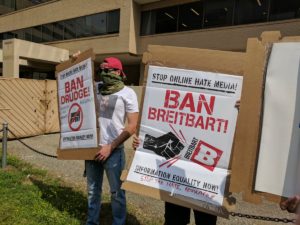by WorldTribune Staff, May 19, 2017
A leftist activist group that claims it wants a “vibrant, free and equal” Internet also wants to ban the Drudge Report and Breitbart.
Members of the campaign “Protect Our Internet” picketed outside the Federal Communications Commission (FCC) on May 18 to protest Chairman Ajit Pai’s proposal to reverse Obama administration net neutrality rules.

The FCC voted 2-1 on May 18 to start the process of eliminating net neutrality rules and the classification of home and mobile Internet service providers as common carriers under Title II of the Communications Act.
Protesters, who had their faces covered, held signs that read “Ban Drudge” with a no symbol over the Drudge Report, the highly trafficked news website run by Matt Drudge, the Washington Free Beacon reported. Other protesters held signs calling for a ban on other news websites, including Breitbart and InfoWars.
Organizers of the campaign are connected to PopularResistance.org, which features several members of the antifascist (antifa) campaign.
Protect Our Internet claims its mission is to “keep the Internet vibrant, free and equal.”
The campaign also claims net neutrality rules are “protecting our freedom to use the Internet!”
Keeping Obama administration-era net neutrality rules would result in higher Internet prices for consumers and less innovation, according to a May 17 report by the Competitive Enterprise Institute.
The report presented a history of net neutrality regulations and argued that the Internet flourished precisely because it was free from federal government control.
“Consumers should be aware that net neutrality regulations will result in higher prices and less innovation for their broadband services. So, if it ain’t broke, don’t break it,” said Jessica Melugin, an adjunct fellow at the Competitive Enterprise Institute and co-author of the report.
“Just look at Europe’s broadband market. It has long been regulated like a utility, and they now have half as much investment in wireline service as the United States, and their average mobile broadband speeds are 30 percent slower than what Americans enjoy.”
